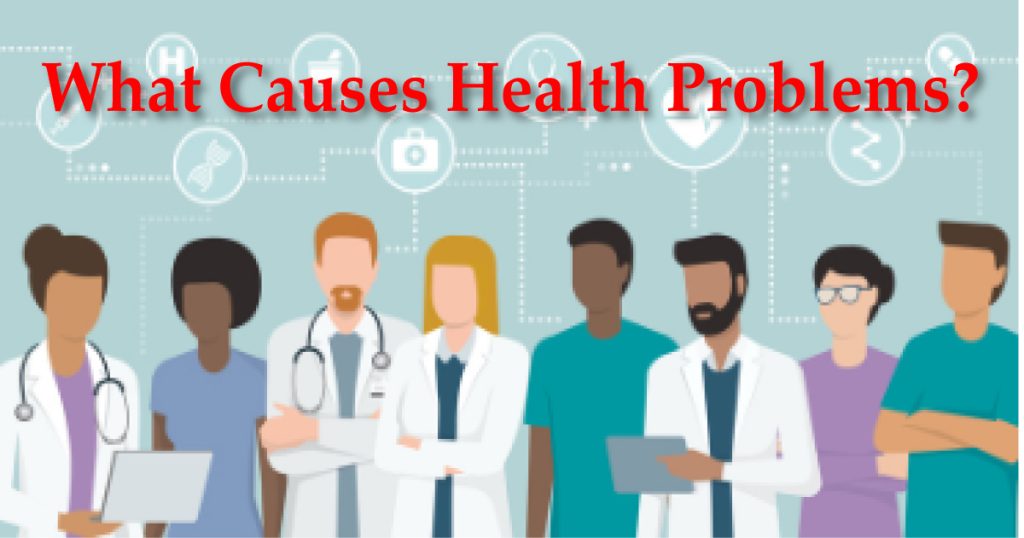Today people differ very much from those of the past; they are stressed and tensed, and diseases are present in every country to millions of the population. Some are minor and can be treated as flu; some are chronic and can dictate the kind of life the affected will have. Sometime in life, every person needs to have an idea of what caused a certain state of ill health, let alone discover ways that can actually be effective for the purpose of effecting change. In this case we will briefly discuss the nation’s biggest health issues and initially see at what, and as a second step, how things go wrong and can be corrected.
What Causes Health Problems?
Several things—kinship and other bodily characteristics, choices people make in their lives, and even surroundings—can lead to health complications. Individuals can act to minimize such risks and make wiser choices when they know of these problems.

1. Lifestyle Choices
Lifestyle plays a great role on the health of a given person. These lifestyle diseases are caused mainly by factors such as smoking, excessive consumption of alcohol, unhealthy dieting and little or no exercise. For instance:
- Poor Diet: Diabetes, cardiovascular disease, stubborn belly fat, and several types of cancer are brought about by poor diets which consists of processed foods and sweet items and unhealthy fats. People who take high levels of Refined sugar it has been noted to lead to metabolic disorders such as Type 2 diabetes and offers insulin boost.
- Lack of Exercise:This lack of exercise causes people to possibly gain weight, suffer from weakened muscles, have poor cardio tracts, and even lead to other disorders such as anxiety and or/ depression. Poor exercise habits are the reason behind plethora of chronic illnesses that include back pains, arthritis, and some forms of cancer.
- Smoking: Other respiratory ailments include lung cancer, emphysema; chronic obstructive pulmonary diseases, and cardiovascular disorders, which are partly caused by smoking. Current cigarette smoke contains elements that can be toxic to the heart, blood vessels and lungs.
- Excessive Alcohol Consumption: Alcohol increases the likelihood of heart diseases, harms the liver (which can result in cirrhosis or fatty liver diseases); and worsens mental illnesses. Alcohol is a cause of some types of cancer and these include; liver cancer, throat cancer and mouth cancer and these are related to chronic alcohol consumption.
2. Genetics
Genetic also plays a big role in the development of health issues. Some diseases are known to be more probable for occurrence in individual who has a family history and hereditary disorders. For example:
- Heart Disease: As much as heart disease is related to inherited genes, people who find themselves in a family where such diseases were rife will always be dragged into a similar situation in future. There is one gene variation for instance that predisposes one to excessive blood pressure, excessive cholesterol and other heart diseases.
- Cancer: Some cancers as breast, colon, ovarian, and prostate cancer may develop into this state due to inherited mutations. Co-specialists may increase their liability for ovarian or breasts cancer in case they possess the BRCA1 and/or BRCA2 genes.
- Diabetes: Because type 2 diabetes is also partially hereditary, people with family antecedents of the disease are more vulnerable to it. Diabetes is inherited through diathesis involving insulin resistance and glucose metabolism ability in an organism.
3. Environmental Factors
Your living conditions can also be the determinant of your health. Many diseases may be attributed to a number of conditions like unsanitary conditions, use of chemicals, environmental pollution and natural changes such as global warming. For instance:
- Air Pollution:Among the respiratory diseases that affected people due to polluted air, lung infections, and asthma. CVDs, stroke, and lung diseases such as lung cancer may be aggravated by long-term air pollution including PM2.5.
- Chemical Exposure: Chronic illnesses such as cancer, hormonal imbalance, birth defects and illnesses related to the neurological system can be made worse by pesticides, industrial chemicals and household products. These products when used out of the recommended limits can cause skin rash and affect the breathing system.
- Climate Change:Heat stress, such as dehydration and heatstroke, respiratory tract infections, and infectious diseases including malaria are escalated by factors such as heat waves, floods and wildfires. In addition, malnutrition may be the result of warming temperatures and changes in the climate that decrease food security.
4. Mental Health Factors
Mental disorders such as anxiety, depression and stress are part of the illness states that affect the health of the human body. To be specific, chronic stress leads to heart disease, high blood pressure, digestive disorders, and weaker immune system. The stress hormone cortisol and other similar compounds result to inflammation that is associated with chronic diseases such as diabetes and arthritis.
For this reason if the body and mind are interconnected, one is very likely to see mental ailments manifest physically. The mentally ill individuals might also have poor personal habits like choosing not to exercise or to eat right, which worsens other physical health complications.
Common Health Problems and How to Solve Them
There are many categories of health problems but some categories are more popular than others. The good news is that many of the resulting problems can be prevented or minimized by taking medication, making changes to your daily routine, or finding other treatments. Below, you will find a few common health concerns and their solutions.

1. Obesity and Overweight
Obesity is one of the major heath issues in the world in the present generation. It is often triggered by environment factors, hereditary, bad diet, and lethargy. Other diseases associated with obesity include diabetes, heart diseases, high blood pressure, sleep disorders including apnea, some types of cancer including breast and colon cancer.
How to Solve Obesity:
- Healthy Diet:The secret is in taking healthy foods that is rich in fruits, vegetables, lean meats and whole grains. Weight loss and enhanced general health call for reduced intake of these other processed foods, sweets, and bad oils. Weight loss entails burning a lower number of calories than one is able to produce and portion control.
- Regular Exercise:Jogging, walking, swimming, biking, and all other kinds of exercise that one perform on a routine basis burn calories but aids in achieving that perfect weight and prevents other health risks associated with it. Weight lifting or aerobics like cycling or jogging, in addition to improving fat metabolism, are important for losing fat.
- Behavioral Changes:Concerning weight loss, people are capable of achieving lasting lifestyle modifications through possessing mind eating practices, observing their diets and setting realistic goals. It can be also used to develop healthy non-temperament traits such as eating slowly and avoiding eating in response to emotions.
- Medical Interventions:For those cases where an individual is considered morbidly or extremely over weight, then some sort of medication or surgery such as bariatric surgery may be recommended. Some of the medication that the doctors use in combination with weight loss regimen include orlistat or GLP-1 agonists. By decreasing the amount of food that can be eaten and calories that can be ingested; methods of procedures such as the gastric bypass facilitates weight loss.
2. Cardiovascular Diseases
Among all the known diseases, that are present around the world, heart diseases are among the leading causes of death. Including hypertension, the cases of heart attacks, strokes, and coronary artery diseases among people. Therefore, cardiovascular disease results from behaviours such as smoking, poor diet and inadequate exercise.
How to Solve Cardiovascular Diseases:
- Dietary Modifications: Omega-3 fatty acids, whole grain products, fruits, vegetables lean meats or protein foods are some of examples of foods that are good for the heart. Decreased amount of salt and saturated fat can actually improve the health of the heart significantly enough. Eating foods such as avocados, almonds, seeds, and fatty fish like mackerel, salmon helps reduce inflammation and improve the heart.
- Exercise:Exercise can also lead to a better cardiovascular health, reduce high blood pressure and high cholesterol levels. Ideally, one should perform at least 150 minutes of moderate level activity in a week. Some of the exercises include walking, running, biking all of which assist in improving the circulation system and the heart.
- Quit Smoking: Exercising can reduce incidents of heart attacks, stroke, and other problems related to the heart as exercise is a major cause of cardiovascular diseases like cigarette smoking. Smoking cessation can be helped by prescription drugs or nicotine replacement products (NRTs).
- Manage Stress: These protocols may be beneficial because chronic stress increases the incidence of heart disease and identifying ways to release and reduce stress is important. Stress management methods can decrease high blood pressure and decrease the load on the heart.

3. Diabetes
Today, related to increase in obesity, ineffective diet, and physical inactivity diabetes, mainly type 2 diabetes, is increasing. This disorder affects the manner in which glucose is utilized in the body and leads to high blood sugar levels that can damage organs and increase kidney failure, heart ailments and nerve damage.
How to Solve Diabetes:
- Balanced Diet: Diabetic patients’ blood sugar levels may be controlled by plans that include mostly healthy fats, minimal processed foods and sugar, and more fiber. Recommended foods for diabetic patients include lean protein, whole grain products, legumes, and green vegetables.
- Physical Activity: Physical activity benefits in controlling blood glucose levels, body pounds, and insulin level. Ideally, three different types of activities: at least 30 minutes of moderate activity for most days of the week. Resistance to insulin can be lowered by undertaking such activities as strength training, cycling and walking.
- Medications:Depending on the severity of the blood sugar fluctuations, they may need to be prescribed type 2 diabetes medicines such as Metformin. However, in the most serious cases, people will have to use insulin for correct blood sugar levels.
- Monitoring Blood Sugar:Diabetes patients need their blood glucose levels to be monitored often in order to ensure that they have not risen to abnormal levels. People with the disease can manage it by being allowed to monitor their blood sugar levels during the day and at night using CGMs.
4. Respiratory Problems
Many respiratory diseases such as asthma, chronic obstructive pulmonary disease and pneumonia arise out of such causes as pollution, smoking and infections. These diseases may greatly affect a person’s ability to breathe and carrying out daily activities.
How to Solve Respiratory Problems:
- Avoid Smoking: The best protection against lung cancer and other varieties of respiratory disorders such as COPD is quitting cigarette smoking. The two forms of help available to smokers who seek help to quit include counseling and nicotine replacement therapies (NRTs).
- Improve Indoor Air Quality: Illnesses caused by physical environmental factors affect the respiratory system and can be prevented by using equipment such as air conditioner, avoiding the use of chemicals that apply dust to rooms, and ensuring adequate availability of fresh air. It was also noted that ventilation could increase indoor air quality, cleaning undertaken together with eradication of potential allergens such as dust mites.
- Medications: It can be prevented or treated by bronchodilators, corticosteroids, inhalers and on extreme occasion antibiotics and oxygen. Cortisone or Prednisone is often used for patients who have severe inflammation and need an inhaler or nebulizer for their breathing to become easier when their airways are opened.
- Regular Check-ups:People with lungs diseases do not let them progress by checking on their condition and seek for a doctor if you have to. I believe that if people visit doctors more often they would detect issues when they are small and the doctors would recommend effective ways of solving them.
5. Mental Health Issues
Some of the most common mental disorders include anxiety, depression, and stress and are on the rise, and their effect on physical health is negative. Pain during sleep, gastrointestinal disorders, and hypertension are activities resulting from chronic stress or other mental disorders.
How to Solve Mental Health Issues:
- Therapy and Counseling: It is a common opinion that anxiety depression and any other mental issues can be solved with the help of a therapist or a counselor. Mainly, there is quite positive experience in implementing mindfulness-based therapies and cognitive-behavioral therapy (CBT).
- Physical Activity:It has been concluded that through the release of endorphins, which is the body’s natural remedies to mild depression and anxiety, exercise reduces the symptoms of the two diseases. Some exercises which may be useful for boosting mental health include yoga, swimming and walking.
- Mindfulness and Relaxation: Some techniques that can aid reduce stress and therefore improve mental health includes deep breathing exercises, yoga and meditation. However, what also helps people regulate their negative emotions and mental patters is mindfulness.
- Social Support: Maintaining cuts with friends and families and whenever the need arises, finding a professional to help is very crucial to mental health. Interacting with others or even just talking to a fellow member of the societal forum of an online group pointed towards a path of nurturing proper mental health helps a lot.
Conclusion
Health problems are polygensic and are caused by various factors because of the environment, genes, the choices, and effects of mental health. Though some diseases cannot be prevented, the others can be prevented or managed by altering one’s life style, consulting a health care provider and making informed decisions.
By appreciating these issues and implementing the right solutions people can greatly improve their overall health and quality of life. A list of possible actions exists, which can be taken to avoid worsening of certain health conditions and live a healthier, more fulfilling life including losing weight, taking balanced diet and regular exercises, quitting smoking, or having a therapist.
The primary goal for any person is to ensure that they lead a healthy life, and to do this will require information on how to live a healthy life. It is possible to get over diseases or illnesses and have the best life of our lives if only we change our habits positively.